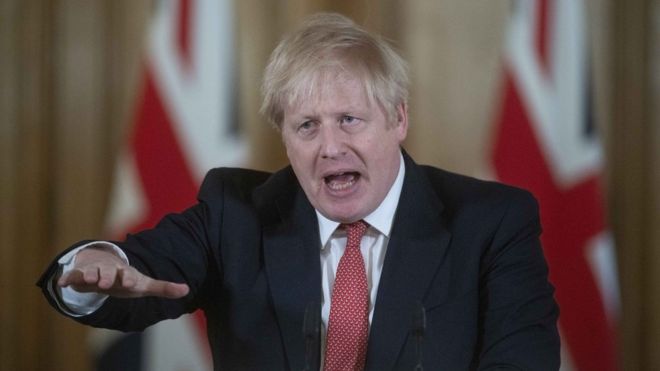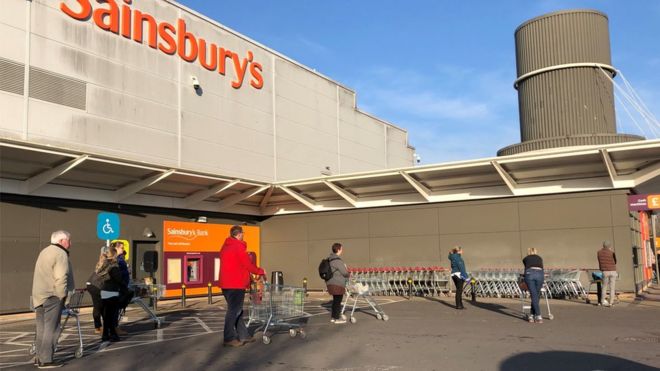(Source: Getty Images via BBC – https://ichef.bbci.co.uk/news/660/cpsprodpb/C1CD/production/_111331694_p0818tr7.jpg)
The world is currently facing a global crisis that is arguably unprecedented in its impact on all facets of global life, human activity, business…everything you could think of.
The COVID-19 outbreak, a new strain of coronavirus that was first reported in Wuhan, China, is not as deadly as the bird flu pandemic that afflicted Asia 15 years ago, which killed 60% of infected people, but COVID-19’s rate of infectivity is far higher.
A report published on Monday night by the Imperial College COVID-19 Response Team damned the UK government’s initial strategy of mitigation that eschewed blanket self-isolating and social distancing measures in favour of a more incremental approach.

Source: PA Media via BBC – https://ichef.bbci.co.uk/news/660/cpsprodpb/FE7C/production/_111384156_hi060739962.jpg
The report found that mitigation strategies of this ilk – of only isolating suspect cases and their family members instead of wider sections of society – would grossly exceed emergency surge capacity limits of British and American healthcare systems ‘many times over’, and that as many as 250,000 consequents deaths were predicted in the UK.
Azra Ghani, a professor and Imperial College’s chair of infectious diseases epidemiology, told journalists as the report was released on Monday night: “We were expecting herd immunity to build. We now realise it’s not possible to cope with that.”
Renegades of Newcastle wondered whether there was a local resident who could speak on social distancing, as an ordinary civilian who is looking to experts to find a solution.
We spoke to Matthew McTeer, a master’s student in data science at Newcastle University and domestic assistant at the Royal Victoria Infirmary, a large NHS hospital in Newcastle.
“In times like these, I think everyone wants the informed science to take the lead on how to deal with the coronavirus outbreak,” said McTeer.
“It was therefore so concerning to see the UK government take such an initially different approach to the rest of the developed world.
“I wonder if there were unnecessary deaths because of this.”
Source: AFP News Agency YouTube account – https://www.youtube.com/watch?v=cZYXBJ7miuY
While the UK government have now officially instructed businesses such as pubs and restaurants to close, introduced a £350bn government fund providing loans to businesses, and a government economic stimulus was announced on Friday to pay workers 80% of their wages when they have to self-isolate, this stimulus is yet to cover the unemployed, self-employed and ‘gig economy’ workers.
The delay in implementing proper social distancing measures has also likely led to an unnecessary spike in cases, as shown in the graph below:

Source: Financial Times – https://www.ft.com/content/a26fbf7e-48f8-11ea-aeb3-955839e06441
The UK government have incrementally stepped up measures, initially on only an advisory level, leaving many to ignore guidance such as to not attend pubs, restaurants or clubs until the government demanded their closure.
For example, students in Newcastle packed the bars along Osborne Road on St Patrick’s Day, while pubs and restaurants were likely to have felt unable to close as the government’s only advisory policies had prevented small businesses from claiming insurance to close, since it would technically be voluntary.

Source: The Washington Post – https://www.washingtonpost.com/graphics/2020/world/corona-simulator/?fbclid=IwAR0Jk4Smt5NK4oRjS_fwIUKS9m1HCzlVr7JIT0LHqmdlUycLje25hhZ3e6g
“I read an article recently from the Washington Post that detailed modelling of how social distancing measures work. As a data science student, this really peaked my interest,” said McTeer.
Depicting ‘a town of 200 people’ where everyone starts in a random position and moves at a random angle, with one person starting as sick, the article models the following:

(sky blue representing the healthy, orange representing the infected, and pink representing the recovered; y axis representing number of people, x axis representing time)
While the modelling is added with the caveat that ‘these simulations vastly oversimply the complexity of real life’, it is also ‘math, not prophecy’.
“While the modelling probably needs augmenting with medical details that I would not be qualified to comment on, the modelling gives us a useful mathematically-derived indication of how rapid exponential increases in cases of coronavirus infection can be reduced while increasing social distancing measures,” says McTeer.
“It seems clear to me that the best way to manage the impact of coronavirus on the NHS, as indicated by the modelling, would be to adopt proper social distancing measures.
“I work as a domestic assistant at the RVI hospital, and it is clear for me to see the strain our doctors, nurses and other medical professionals are under. I am very thankful for all that they are doing.”

Source: Opinium via The Observer – https://www.theguardian.com/world/2020/mar/14/only-36-of-britons-trust-boris-johnson-on-coronavirus-poll-finds
A survey by Opinium for the Observer, published in an article on 14th March, found that only 34% of 2,005 UK adult respondents from 12th–13th March trusted what Boris Johnson said on the matter, while 73% were now worried about the virus.
The survey also found that 41% thought the government were either slightly or significantly underreacting to the crisis, compared to 41% who thought they were reacting proportionally, and 12% who thought they were either slightly or significantly overreacting.
The confusion is clearly not helpful, while the strain on the NHS needs to be better accounted for.

Source: PA Media via BBC – https://ichef.bbci.co.uk/news/660/cpsprodpb/404B/production/_111395461_e84f2bef-9a7e-4360-8d0e-42556e6df31d.jpg
In light of the Imperial College report, and the modelling from the Washington Post on social distancing, it seems clear that the best way of preventing loss of life in the UK to a potential 250,000 deaths, and to reduce the burden on NHS staff, would be to slow the rate of infectivity through social distancing
Following subsequent measures by the UK government encouraging self-isolation for anyone showing symptoms, encouraging people to work from home, advising against non-essential travel and demanding the closure of bars, clubs and restaurants, as well as introducing statutory sick pay, providing mortgage holidays and government loans to businesses, more needs to be done, particularly for those not covered by the government stimulus.
Renegades of Newcastle thanks Matthew McTeer for talking to us.
For more information on the COVID-19 outbreak, please see the NHS website.
